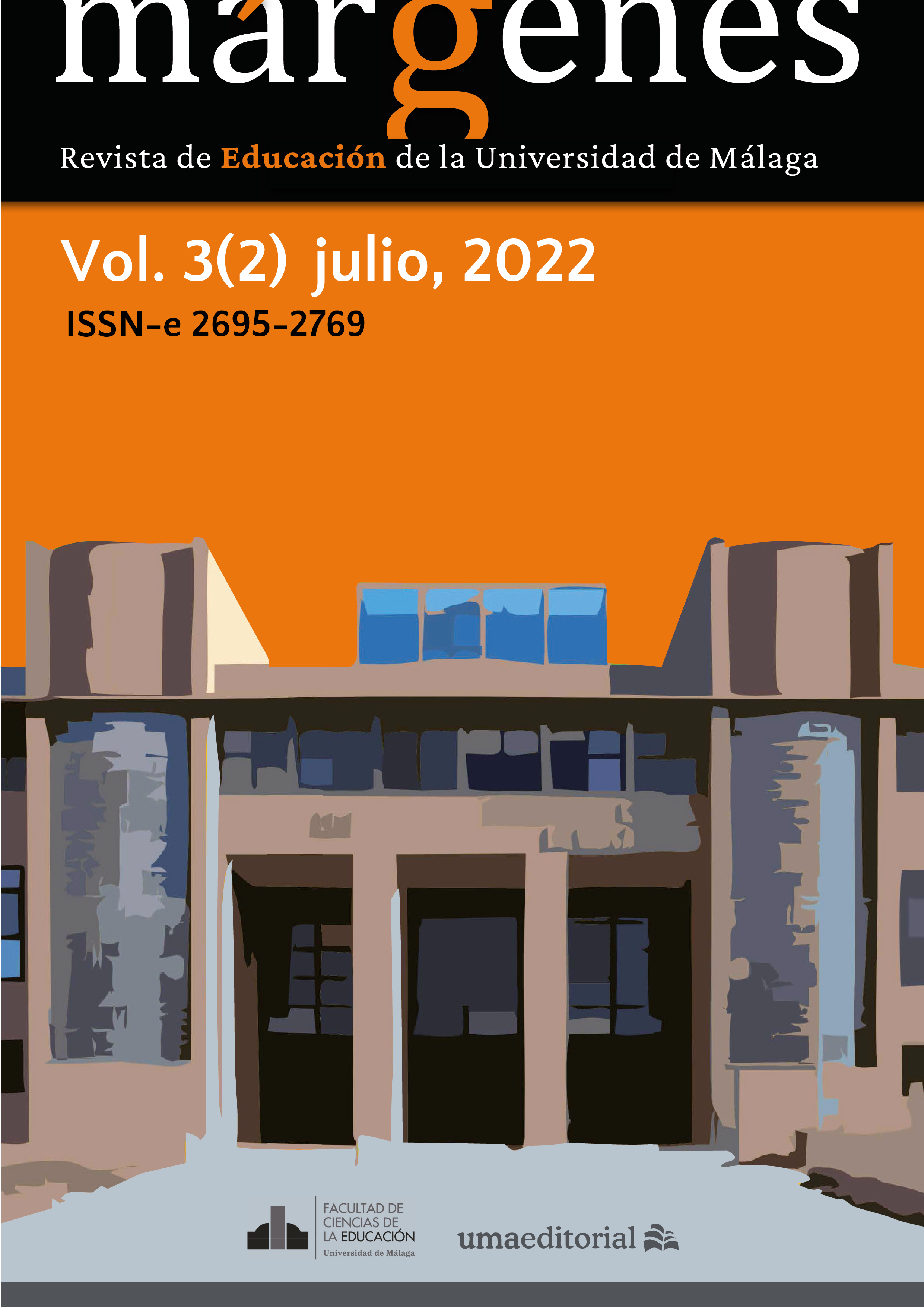Con labios de granito: sobre la nostalgia del estudio
DOI:
https://doi.org/10.24310/mgnmar.v3i2.14817Palabras clave:
estudio, filosofía de la educación, formación docenteResumen
Se trata, en este ensayo, de proseguir con una reflexión filosófica sobre estudio entendido como un arte de la existencia o como un modo de vida. Se parte de algunos presupuestos esenciales. Primero, que estudiar no es lo mismo que aprender. Segundo, que el estudio compone una forma singular de estar en el mundo y de organizar la propia existencia en él, una en la que las relaciones entre el estudioso y el mundo mismo (entre la vida contemplativa y la vida activa) resultan problemáticas. Y tercero, que el estudio es una actividad de carácter interminable que se realiza al margen de cualquier finalidad utilitaria, pero también un lugar que el estudioso habita en una especie de exilio voluntario. De acuerdo con esto, este texto ofrece una meditación sobre lo que se llamará nostalgia del estudio, una nostalgia vinculada a una experiencia de la pérdida (de la estudiosidad) y a un deseo de feliz regreso al hogar (la casa del estudio). A través de las prácticas estudiosas (leer, pensar, escribir), el estudioso, en su conversación con los muertos a quienes lee, tiene la sensación de que le susurran, desde sus tumbas, con labios de granito.
Descargas
Métricas
Citas
Arendt, H. (2005). La condición humana. Paidós.
Auden, W. H. (2006). Canción de cuna y otros poemas. Lumen. Selección, traducción y prólogo de Eduardo Iriarte.
Bárcena, F. (2017). El aprendiz eterno. Filosofía, educación y el arte de vivir. Miño & Dávila.
Bárcena, F. (2020a). Maestros y discípulos. Anatomía de una influencia. Ápeiron Ediciones.
Bárcena, F. (2020b). “Meditación sobre la vida estudiosa”, en Bárcena, F., López, M. V., Larrosa, J. (eds.) (2020) Elogio del estudio (pp. 25-68). Miño & Dávila.
Bárcena, F., López, M. V., Larrosa, J. (eds.) (2020). Elogio del estudio. Miño & Dávila.
Cassin, B. (2022). La nostalgia. Ulises, Eneas, Arendt. Alianza editorial.
Costa, F. (2018). Entrevista. Giorgio Agamben: Autorretrato al óleo del filósofo poeta. Clarín, 14.09. https://www.clarin.com/revista-enie/ideas/giorgio-agamben-autorretrato-oleo-filosofo-poeta_0_Bk-ln3FOX.html
Fuentes Megías, F. (2019) El filósofo, el psicagogo y el maestro. Filosofía y educación en Pierre Hadot y Michel Foucault. Miño & Dávila.
Hadot, P. (2006). Mis libros y mis estudios. En Ejercicios espirituales y filosofía antigua. Siruela.
Heidegger, H. (2003). Ser y Tiempo. Trotta.
Heidegger, M. (2010). Los conceptos fundamentales de la Metafísica. Mundo, finitud, soledad. Alianza Editorial.
Kundera, M. (2000). La ignorancia. Tusquets.
Larrosa, J. (2019a). Esperando no se sabe qué. Sobre el oficio de profesor. Candaya.
Larrosa, J. (2019b). Vindicación del estudio como concepto educativo: a propósito de aprender / estudiar una lengua. Teoría de la Educación. Revista Interuniversitaria, 31(2), pp. 131–151. DOI: http://dx.doi.org/10.14201/teri.20524
López, M. (2020). “Del ocio al estudio: sobre el cultivo y la transmisión de un arte”, en Bárcena, F., López, M., y Larrosa, J. (eds.) Elogio del estudio (páginas). Miño & Dávila.
Marx, W. (2009). Vie du lettré. Les Éditions de Minuit.
Masschelein, J. (2020). “Hacer escuela. La voz y la vía del profesor”. En Bárcena, F., López, M., y Larrosa, J. (eds.) Elogio del estudio (páginas). Buenos Aires, Miño & Dávila.
Monegal, A. (2022). Como el aire que respiramos. El sentido de la cultura. Acantilado.
Nietzsche, F. (2006). Genealogía de la moral. Alianza editorial.
Nietzsche, F. (2007). Fragmentos póstumos, vol. II. Tecnos.
Oakeshott, M. (2009). “La educación: el compromiso y su frustración”. En La voz del aprendizaje liberal (pp. 93-132). Katz Editores.
Rancière, J. (2006). Universalizar la capacidad de cualquiera. Archipiélago Cuadernos de crítica de la cultura, 73-74, 70-79.
Safranski, R. (2022). Ser único. Un desafío existencial. Tusquets.
Sánchez Rojo, A. (2016). El aburrimiento como competencia: educación para un mundo sobreestimulado. Teoría de la Educación. Revista Interuniversitaria, 28(2), 93-112. DOI: https://doi.org/10.14201/teoredu28293112
Schlanger, J. (1997). La vocation. Seuil.
Publicado
Cómo citar
Número
Sección
Licencia
En la Revista Márgenes apostamos claramente por una política de acceso abierto del conocimiento científico (Veáse Declaración de Berlín).
Aquellos autores/as que tengan publicaciones con esta revista, aceptan los términos siguientes:
-
Esta revista provee acceso libre inmediato a su contenido bajo el principio de hacer disponible gratuitamente la investigación al público. Todos los contenidos publicados en Márgenes, están sujetos a la licencia de Creative Commons Reconocimiento-SinObraDerivada 4.0 Internacional.
Es responsabilidad de los autores/as obtener los permisos necesarios de las imágenes que están sujetas a derechos de autor.
Los autores-as cuyas contribuciones sean aceptadas para su publicación en esta revista conservarán el derecho no exclusivo de utilizar sus contribuciones con fines académicos, de investigación y educativos, incluyendo el auto-archivo o depósito en repositorios de acceso abierto de cualquier tipo.
La edición electrónica de esta revista esta editada por la Editorial de la Universidad de Málaga (UmaEditorial), siendo necesario citar la procedencia en cualquier reproducción parcial o total.
- Los-as autores-as podrán adoptar otros acuerdos de licencia no exclusiva de distribución de la versión de la obra publicada (p. ej.: depositarla en un archivo telemático institucional o publicarla en un volumen monográfico) siempre que se indique la publicación inicial en esta revista.
- Se permite y recomienda a los-as autores-as difundir su obra a través de Internet (p. ej.: en archivos telemáticos institucionales o en su página web) antes y durante el proceso de envío, lo cual puede producir intercambios interesantes y aumentar las citas de la obra publicada. (Véase El efecto del acceso abierto).














